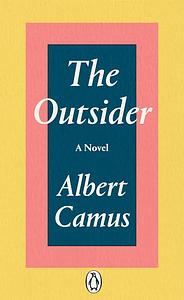Take a photo of a barcode or cover
Second book in my Camus re-read. Like Sisyphus before it, my opinon has not changed. Still find this contrived and unsatifying.
Yes, I have read all the arguments, but it is just very hard not to see Mersault as just a boring, run-of-the-mill sociopath. Never does he really express any empathy or morals. The trial continues to feel a contrivance to get Mersault to a place where he can "philosophize" his way to articulate an absurdist position. And last, perhaps in 1942 this was much more radical, but the confrontation with the priest just lacks stakes.
Honestly, hoping my "yes, I was right the first go-around" holds for The Plague which is up next (in a new translation!) in my Camus re-read, because honestly it is hard to believe that the same person wrote this insufferable book as wrote The Plague...
Yes, I have read all the arguments, but it is just very hard not to see Mersault as just a boring, run-of-the-mill sociopath. Never does he really express any empathy or morals. The trial continues to feel a contrivance to get Mersault to a place where he can "philosophize" his way to articulate an absurdist position. And last, perhaps in 1942 this was much more radical, but the confrontation with the priest just lacks stakes.
Honestly, hoping my "yes, I was right the first go-around" holds for The Plague which is up next (in a new translation!) in my Camus re-read, because honestly it is hard to believe that the same person wrote this insufferable book as wrote The Plague...
I feel very far removed from his perspective but the book does remind me of an argument I had with my 6th grade teacher. She was telling me that the climax of a short story we were reading was on the last page. I kept saying no, no, it’s when they go to the Chinese restaurant, it’s when they eat celery and take out the strings, and she said no, it’s at the very end, when she accepts herself. Hmm maybe this will be one of the things I always remember. Anyways, for this book, I finally understood what she was talking about— the most important part was after the last few pages, after his veneer cracks, after he yells at the chaplain. Even if it wasn’t a release of emotions that he’d been bottling up, Meursault finally fully experienced emotions all the same— he gets one day, or a few hours, of living before he died.
‘Opened myself up to the gentle indifference of the world.’
‘Opened myself up to the gentle indifference of the world.’
dark
reflective
tense
slow-paced
Plot or Character Driven:
A mix
Strong character development:
Complicated
Loveable characters:
No
Diverse cast of characters:
No
Flaws of characters a main focus:
Yes
There's so much hype and praise around this book, but it's just....whatever....
reflective
medium-paced
Good, possibly awesome, surprisingly comic and lighthearted. It was an unusual pairing with reading The Immoralist, which talks about some of the same emotional states but makes an entirely different statement about them. Possibly this didn't have an epic impact only because its sort of cold matter-of-factness has been adopted by many authors with less mojo than Camus.
dark
reflective
tense
medium-paced
Plot or Character Driven:
Character
Strong character development:
No
Loveable characters:
Complicated
Diverse cast of characters:
No
Flaws of characters a main focus:
Complicated
reflective
slow-paced
Plot or Character Driven:
Character
Strong character development:
Complicated
Loveable characters:
No
Diverse cast of characters:
Yes
Flaws of characters a main focus:
Yes
dark
reflective
sad
tense
fast-paced
Plot or Character Driven:
A mix
Strong character development:
No
Loveable characters:
No
Diverse cast of characters:
No
Flaws of characters a main focus:
Yes
dark
emotional
hopeful
inspiring
relaxing
sad
Plot or Character Driven:
Character
Strong character development:
No
Loveable characters:
Yes
Diverse cast of characters:
Yes
Flaws of characters a main focus:
Yes
dark
funny
reflective



